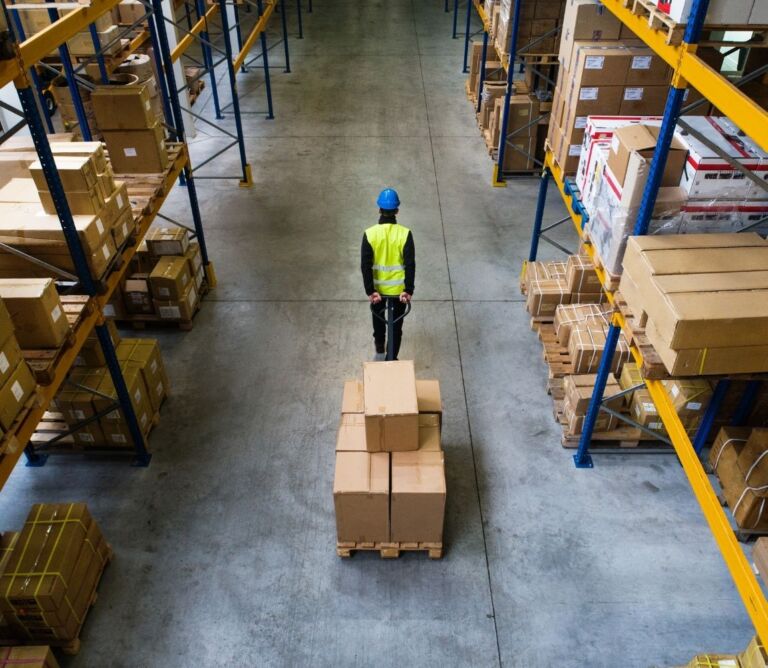What Are Logistics Services? Meaning, Types, and Benefits

Logistics services are the backbone of any supply chain, encompassing all the activities needed to move goods efficiently from their source (like a factory or supplier) to the end customer. In simple terms, a logistics service ensures that products get to the right place, at the right time, in the right condition, and at the right cost, which supply chain experts often call the “seven R’s” of logistics. This includes managing inbound shipments of raw materials, warehousing and inventory control, fulfilling orders, and outbound transportation for final delivery. In fact, the scale of modern logistics is enormous, over 160 billion parcels were delivered worldwide in 2022 alone, highlighting how crucial efficient logistics services are for today’s economy.
Businesses across nearly every industry – from e-commerce and retail to manufacturing and pharmaceuticals – rely on logistics services to handle these supply chain operations. For example, a logistics partner might arrange ocean freight shipping from an overseas factory to a U.S. port, handle customs clearance, transport the goods to a warehouse, then manage order fulfillment (picking & packing) and book local carriers for last-mile delivery to customers. By outsourcing such complex tasks to expert logistics service providers (often called 3PLs or 4PLs), companies can streamline operations, reduce costs, and focus on their core business.
What logistics services include
Multiple types of logistics services come into play to move products through the supply chain. The major categories of services include:
- Transportation & Freight: Coordinating the movement of goods by truck, rail, ship, or air. Logistics providers handle carrier bookings and paperwork (often via freight forwarders or 3PL partners) so that products move smoothly from factories into the distribution network. This covers everything from local trucking to international shipping, essentially the transport and logistics services that physically relocate goods.
- Warehousing & Storage: Receiving and storing inventory until it’s needed. Warehousing services include loading/unloading inbound freight, organizing products in storage, and performing cross-docking when needed. A logistics warehouse might also pick and pack orders, then load goods back onto trucks for shipment to retailers or customers.
- Order Fulfillment: Picking, packing, and shipping customer orders accurately and quickly. Fulfillment centers (which can be run by third-party logistics providers) handle order processing and integrate with carriers like UPS, FedEx or DHL for last-mile delivery. This logistics delivery service ensures each order gets to the right customer on time, whether it’s B2C e-commerce shipping or B2B retail restocking.
- Inventory Management: Tracking stock levels and planning restocking. Modern logistics providers offer software that gives real-time inventory visibility, forecasts demand, and helps prevent stockouts. These tools ensure the right amount of inventory is in each warehouse.
- Value-Added Services: This includes activities like custom packaging, kitting/assembly, quality inspections, labelling, and returns handling (reverse logistics). For international logistics, it often involves customs brokerage and clearance paperwork as well. Providers may bundle these warehousing and logistics services to offer a one-stop solution.
These components work together so products flow smoothly through the supply chain. Whether you sell online or in stores, a comprehensive logistics service handles every step, from inbound freight to final delivery, so your team can focus on growing the business.
Benefits of Logistics Services
- Cost Savings: Logistics service providers cut costs by consolidating shipments, optimizing routes, and negotiating better freight contracts. They also reduce storage expenses through smarter inventory management, helping companies ship more cost-effectively.
- Improved Efficiency: Professional logistics services use advanced route planning, warehouse automation, and coordinated freight management to reduce delays and errors. This results in a faster, leaner supply chain.
- Enhanced Customer Service: Fast and accurate logistics delivery services improve customer satisfaction. By placing inventory closer to customers and using reliable carriers, companies can meet same-day or 1–2 day shipping expectations.
- Scalability and Flexibility: Logistics providers scale operations up or down as demand changes. They offer on-demand warehousing, seasonal support, and nationwide transport and logistics services without heavy upfront investments.
- Focus on Core Business: Outsourcing logistics allows companies to focus on growth, marketing, and customers while experts manage warehousing, shipping, and compliance. This creates efficiency and frees resources.
Strong logistics services mean lower costs, better efficiency, and happier customers, a competitive edge for any business. Local distribution centers also shorten delivery times from a week to just 1–2 days.
Logistics Services Near Me and Local Warehousing
Many businesses today search for “logistics services near me” – and for good reason. Using local or regional warehouses as distribution hubs can dramatically speed up delivery times. Having inventory stored closer to your end customers essentially gives you a shortcut for fast shipping and more reliable service. Instead of sending every order across the country from one central warehouse (which takes longer and costs more), a company can fulfill orders from a nearby facility and cut out days of transit. Proximity = speed: strategically placed warehouses have been shown to reduce delivery times from 5–7 days down to 1–2 days in some cases. In other words, local warehousing translates directly into faster deliveries, lower shipping costs, and fewer transit risks for damage or delay.
Storing products in regional hubs helps companies cut delivery times from several days to just 1–2. For example, an e-commerce retailer with fulfillment centers on both coasts can reach most customers within two days via ground shipping. The same applies to retail stores – shelves are restocked faster when inventory is closer.
Working with a logistics partner that has a wide warehouse network makes this strategy simple. OLIMP’s on-demand warehousing connects businesses to 5,000+ warehouses across North America, allowing even small companies to place inventory in key regions without heavy investment.
By decentralizing stock through on-demand logistics services, businesses can achieve faster, more reliable deliveries and compete with large-scale providers.
Choosing the Right Logistics Services Provider
When searching for logistics services (especially locally), consider factors like service coverage, technology, and flexibility:
- Network and Coverage: Strong logistics service providers offer broad warehouse and transportation networks. A wide reach ensures nationwide distribution and faster fulfillment.
- Speed and Responsiveness: Look for providers that can launch operations quickly, scale up during peak seasons, and handle urgent requests. On-demand services with flexible contracts give businesses agility.
- Technology Integration: A good logistics partner offers visibility (online dashboards, tracking, inventory apps). This transparency helps you monitor shipments and stock in real time. Ask about their warehouse management system (WMS) and transportation management system (TMS) tools.
- Value-Added Services: Beyond basic shipping and storage, consider what additional services the logistics provider can bundle for you. Do you need climate-controlled storage, product assembly/kitting, custom packaging, freight consolidation, or handling of hazardous materials? Ensure the company offers all the warehousing and logistics services required for your products. The right provider will bundle these into one solution so you don’t have to juggle multiple vendors. For example, if you need returns processing or specialized labeling, it’s ideal if the logistics partner can do that in-house as part of their service package.
- Pricing and Scalability: Transparent pricing is key. Providers should clearly outline storage, handling, and shipping costs. Ensure they can scale with business growth and adapt to new markets.
- Customer Support and Experience: Choose a logistics partner with proven industry experience, good testimonials, and dedicated account management. Trust and reliability are essential for long-term success.
Logistics services are the foundation of every successful supply chain – from warehousing and inventory management to freight and last-mile delivery. Choosing the right logistics service provider makes the difference between slow, costly operations and a streamlined supply chain that drives growth.
At OLIMP Warehousing Solutions, we connect businesses with 5,000+ warehouses across North America, offering flexible and cost-effective logistics solutions tailored to your needs. Whether you need short-term storage, retail logistics services, or end-to-end supply chain support, our platform gives you the coverage and scalability to compete at every level.
With transparent pricing, responsive support, and advanced technology, OLIMP makes logistics simple, reliable, and efficient. If you’re looking for a trusted partner to handle your warehousing and logistics services, request a free quote today and discover how OLIMP can optimize your supply chain.
Frequently Asked Questions (FAQ) – OLIMP Warehousing
Q: What is the meaning of logistics services?
Logistics services cover every step of a supply chain, from inbound transport of materials, through warehousing and order processing, to outbound shipping and delivery to customers. In essence, logistics services ensure products are moved and stored so they arrive at the right place, at the right time, as efficiently as possible.
Q: What do logistics providers do?
A logistics provider (or LSP) handles parts or all of the supply chain. This can include managing warehouses in multiple regions, coordinating freight (truck, rail, ship, air), running fulfillment centers, and even offering additional services like customs clearance and returns processing. For example, a 4PL (fourth-party logistics) firm may orchestrate multiple 3PLs to give a turnkey solution across global channels.
Q: Why are logistics services important?
Effective logistics services maximize efficiency and cost-effectiveness. They allow businesses to scale and meet customer expectations for fast, reliable delivery. Companies that optimize logistics often see lower shipping costs, fewer stockouts or overstocks, and higher customer satisfaction. In today’s market, strong logistics are a competitive edge, a late delivery can cost customer loyalty, while a smooth supply chain drives growth.
Q: What types of logistics services are available, and what does each include?
Logistics services typically include transportation, warehousing, distribution, inventory management, fulfillment, and value-added services. Transportation covers freight movement by truck, rail, ocean, or air. Warehousing involves storage and handling, while distribution and fulfillment focus on order processing, packing, and last-mile delivery. Some providers also offer services like cross-docking, transloading, and returns management.
Q: How do I choose a logistics provider for my eCommerce business?
When choosing a logistics provider for eCommerce, look for scalability, warehouse location coverage, technology integration, and fulfillment speed. The right provider should support fast order processing, real-time inventory visibility, easy integrations with eCommerce platforms, and flexible storage options to handle seasonal demand.
Q: What are the main cost components of logistics services, and how can they be reduced?
Key logistics cost components include transportation, warehousing, labor, inventory holding, and handling fees. Costs can be reduced by consolidating shipments, using strategically located warehouses, optimizing inventory levels, and selecting flexible logistics services such as on-demand warehousing or transloading instead of long-term fixed contracts.
Q: What are the benefits of outsourcing logistics versus handling it in-house?
Outsourcing logistics allows companies to reduce overhead costs, gain access to specialized expertise, and scale operations faster. Compared to in-house logistics, third-party logistics providers offer established networks, advanced technology, and flexible capacity without the need for capital investment in warehouses, labor, or equipment.
Q: What key performance indicators (KPIs) should logistics providers track?
Common logistics KPIs include on-time delivery rate, order accuracy, inventory turnover, order fulfillment time, and cost per shipment. Tracking these metrics helps logistics providers measure efficiency, identify bottlenecks, and improve overall delivery performance and customer satisfaction.
You may be interested in

How E‑commerce Is Reshaping U.S. Logistics Real Estate in 2026
The e‑commerce boom continues to transform how goods move through the U.S. supply chain. As online penetration climbs toward 20 % of global retail sales by 2026, digital retailers and their logistics partners are racing to secure warehouse space. Research by Prologis shows that e‑commerce companies will account for nearly a quarter of all new […]

Winter Shipping Challenges in the USA: Transit, Capacity & Cold-Weather Logistics
Winter weather can significantly disrupt shipping in the USA. Ice, snow and holiday surges lead to slower transit times, capacity crunches and higher costs – introducing “specific operational risks” that can quietly derail the supply chain. In other words, winter shipping is about much more than a bit of cold or fuel costs; it demands […]

Planning for Chinese New Year 2026: How U.S. Importers Can Navigate Major Logistics Disruptions
Chinese New Year (Lunar New Year or Spring Festival) 2026 begins on February 17 (the Year of the Horse). This holiday is Asia’s biggest annual manufacturing shutdown, with official holidays likely Feb 17–23. In practice, factories begin closing weeks early and resume slowly, so the supply chain impact often stretches roughly mid-January through early March. […]
Ready to streamline your warehousing needs?
Request a quote today and discover how OLIMP's tailored solutions can optimize your operations